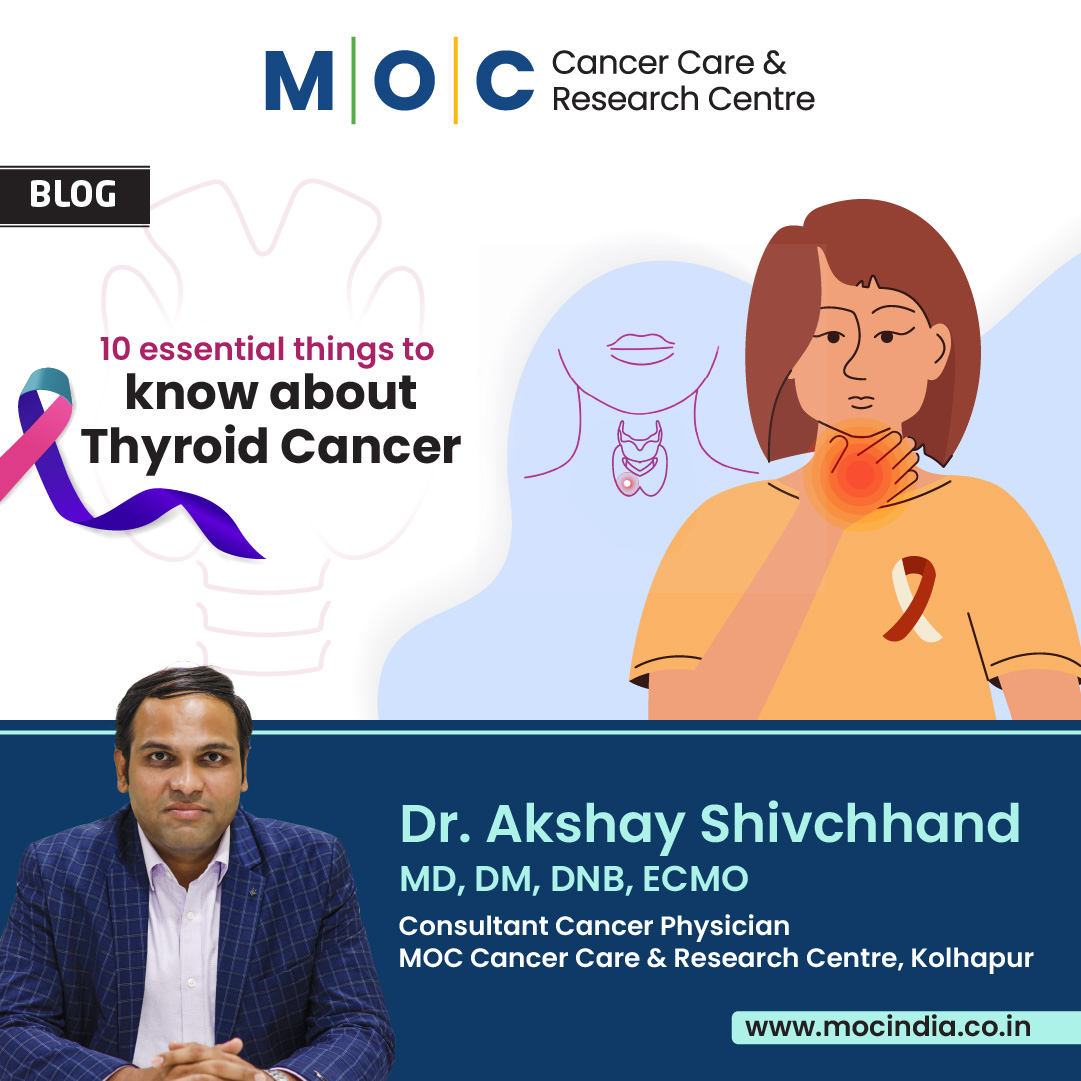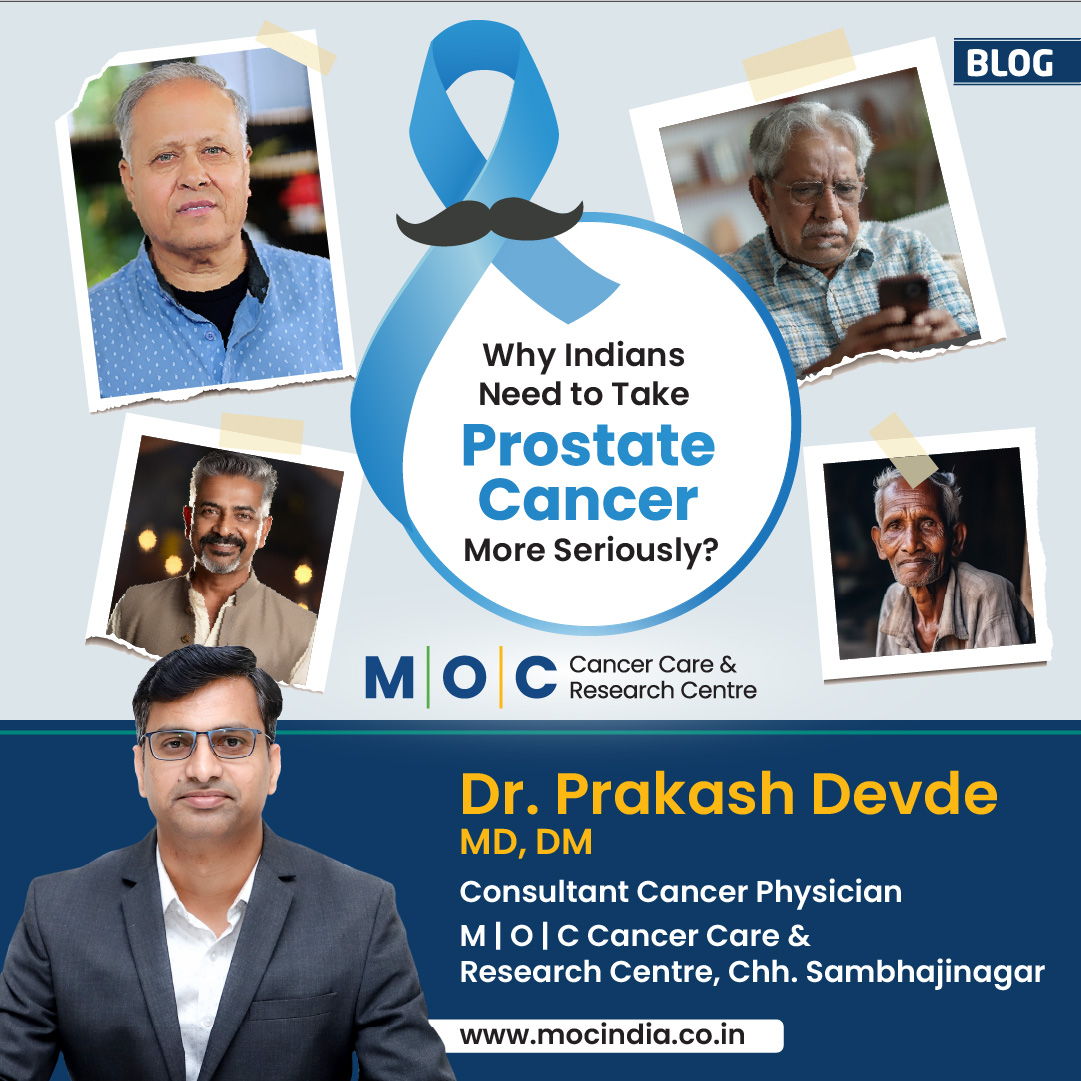10 Essential Things to Know About Thyroid Cancer



The thyroid gland, is a butterfly-shaped organ located at the base of the neck. It plays a crucial role as a metabolism regulator. While thyroid cancer is relatively uncommon, understanding its signs and symptoms can empower you to take charge of your health. September marks Thyroid Cancer Awareness Month, a time to shed light on this often overlooked yet impactful health condition.
In this blog, I am sharing 10 key facts about thyroid cancer that you should be aware of.
- Types of Thyroid Cancer: There are four main types of thyroid cancer – papillary, follicular, medullary, and anaplastic. Papillary is the most common, typically slow-growing and highly treatable. Follicular cancer also has a generally favourable prognosis. Medullary cancer can be inherited and sometimes produces hormones that cause symptoms beyond a lump. Anaplastic cancer is the most aggressive but fortunately, the rarest form.
- Warning Signs: While there might not be noticeable symptoms in early stages, a lump in the front of your neck, especially near the Adam's apple, is a common sign of thyroid cancer, but is often overlooked. Other potential indicators include changes in voice (hoarseness), difficulty swallowing or breathing, and persistent coughing or neck pain.
- Risk Factors: Certain factors increase the risk of thyroid cancer. These include a family history of the disease, radiation exposure to the head and neck, overweight and obesity, and specific genetic syndromes. Research shows, women are more likely to develop thyroid cancer than men.
- Diagnosis: If you experience any potential signs, consult your oncologist immediately. They may recommend a physical exam, blood tests to measure thyroid hormone levels, and a thyroid ultrasound. If further investigation is needed; fine-needle aspiration biopsy can be used to analyse a sample of thyroid tissue.
- Treatment Options: The treatment course for thyroid cancer depends on the type, size, and stage of the disease. Common options include surgery to remove all or part of the thyroid gland, radioactive iodine treatment to destroy remaining thyroid tissue, and medication to suppress thyroid hormone production.
- Prognosis: The good news is that most cases of thyroid cancer have a very high cure rate, especially when detected early. Regular follow-up appointments with your doctor are crucial to monitor your health and ensure there's no recurrence.
- Importance of a Healthy Lifestyle: Maintaining a healthy weight and diet can play a role in overall well-being, although no specific dietary changes have been directly linked to reducing the risk of thyroid cancer.
- Managing Side Effects: Treatment may come with side effects like fatigue, voice changes, or hypothyroidism (underactive thyroid). These are often manageable with medication and lifestyle adjustments.
- Emotional Impact: A cancer diagnosis can be overwhelming. Seeking emotional support from friends, family, or a professional can help. Support groups can be a valuable resource for connecting with others who understand your journey.
- Advocating for Awareness: Spreading awareness about thyroid cancer is crucial for early detection and improved outcomes. Share your story, participate in fundraising events, and support organizations dedicated to thyroid cancer research and patient support. By raising awareness, we can create a more informed and supportive community for individuals affected by thyroid cancer.
By staying informed and taking a proactive approach to your health, you can effectively manage your risk and be prepared to address any thyroid concerns that may arise.
Remember, early detection remains key in achieving the best possible outcomes.
Dr. Akshay Shivchhand
MD DM DNB ECMO
Consultant Cancer Physician
MOC Cancer Care & Research Centre, Kolhapur
.
Latest Blogs
-
![Esophageal Cancer in Rural India: A Rising Threat]()

- 15th Apr, 2025
- Esophageal Cancer in Rural India: A Rising Threat
-
![Why Indians Need to Take Prostate Cancer More Seriously? An Oncologist's Opinion]()

- 20th Mar, 2025
- Why Indians Need to Take Prostate Cancer More Seriously? An Oncologist's Opinion
-
![Women’s Day: A Call for Action Against Women’s Cancers in India.]()

- 10th Mar, 2025
- Women’s Day: A Call for Action Against Women’s Cancers in India.
-
![A Unique Perspective on Women and Cancer- A Food for Thought]()
.jpg)
- 3rd Mar, 2025
- A Unique Perspective on Women and Cancer- A Food for Thought
-
![Bridging Hope and Equity for Young Warriors this International Childhood Cancer Day]()
.jpg)
- 18th Feb, 2025
- Bridging Hope and Equity for Young Warriors this International Childhood Cancer Day
-
![World Cancer Day 2025: United by Unique, Empowered by Hope.]()

- 5th Feb, 2025
- World Cancer Day 2025: United by Unique, Empowered by Hope.
Book Your Appointment








